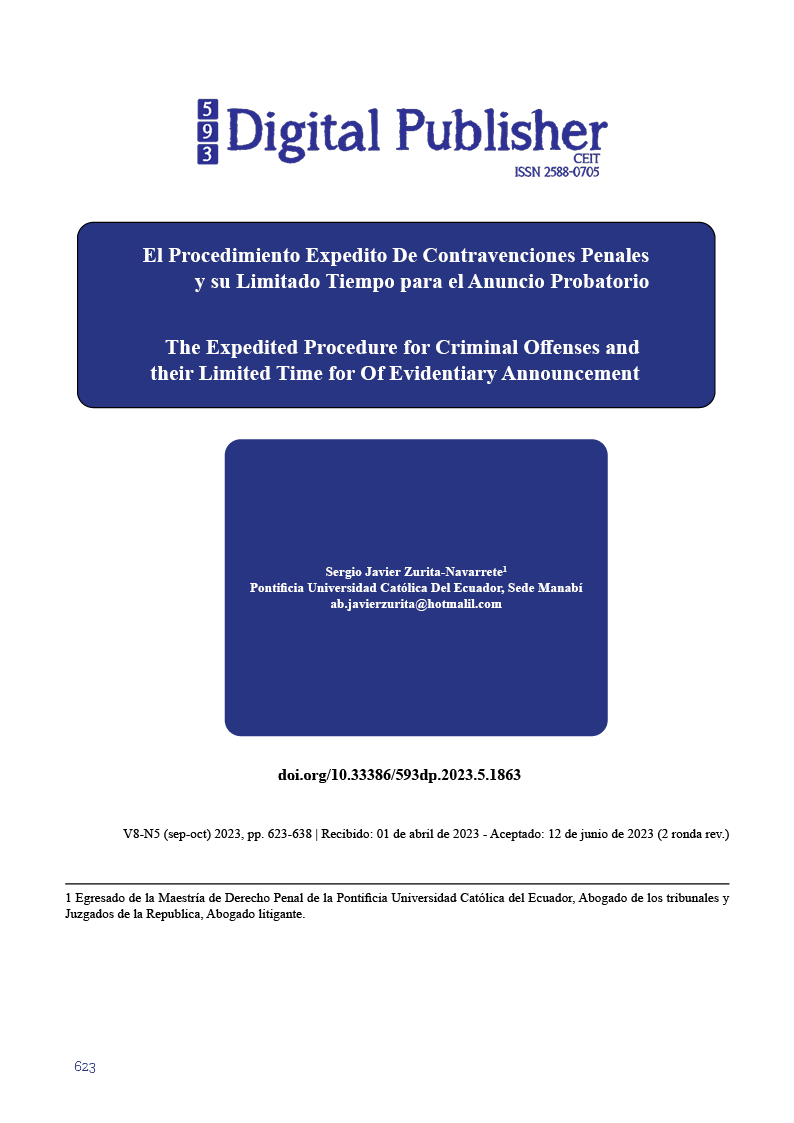The Expedited Procedure for Criminal Offenses and their Limited Time for Of Evidentiary Announcement
Main Article Content
Abstract
The present investigation analyzes the lack of a prudent time to obtain the necessary means of proof within the expedited procedure, which is also known as the obligation to announce the burden of proof in the respective procedure of criminal violations, the existence of such a short time can impact the evidence as one of the most important instruments for the development of the criminal process, since it has a specific objective which is to demonstrate a reality and direct a person to the conviction of a particular fact that needs to be demonstrated.
Likewise, this situation can ignore the procedural activity of the defense, which guarantees people to have the tools to prepare their arguments in the trial and thus grant the judge that persuasion of the disputed facts.
The procedure of criminal contraventions does not take place under the parameters of the right to defense, which determines that the parties to the proceedings must have adequate time and means to prepare the defense and clearly transmit to the judge the reality of the facts. As a result of the investigation carried out, it is determined that the three-day time contemplated by the legislator in the expedited procedure for criminal offences violates the right to defense by preventing the parties to the proceedings from having all the evidence to assert their claims before the judge.
Downloads
Article Details

This work is licensed under a Creative Commons Attribution-NonCommercial-ShareAlike 4.0 International License.
1. Derechos de autor
Las obras que se publican en 593 Digital Publisher CEIT están sujetas a los siguientes términos:
1.1. 593 Digital Publisher CEIT, conserva los derechos patrimoniales (copyright) de las obras publicadas, favorece y permite la reutilización de las mismas bajo la licencia Licencia Creative Commons 4.0 de Reconocimiento-NoComercial-CompartirIgual 4.0, por lo cual se pueden copiar, usar, difundir, transmitir y exponer públicamente, siempre que:
1.1.a. Se cite la autoría y fuente original de su publicación (revista, editorial, URL).
1.1.b. No se usen para fines comerciales u onerosos.
1.1.c. Se mencione la existencia y especificaciones de esta licencia de uso.
References
Cabanellas, G. (2004). Diccionario Jurídico Elemental. Buenos Aires-Argentina.: Editorial Heliasta .
Cabrales, C. (2018). LA CARGA DE LA PRUEBA Y EL DERECHO A PROBAR EN EL CÓDIGO GENERAL DEL PROCESO. Revista Cultural UNILIBRE, 54-71.
Caro, N. (2014). La carga de la prueba frente al principio de presunción de inocencia en el Estado colombiano. Revista Jurídica. Verba Iuris, 29, 31-42. Obtenido de https://revistas.unilibre.edu.co/index.php/verbaiuris/article/view/2182/16
Cea, J. (2004). LA SEGURIDAD JURÍDICA COMO DERECHO FUNDAMENTA. Revista De Derecho, 47-70. Obtenido de https://revistaderecho.ucn.cl/index.php/revista-derecho/article/view/2147/2682
Cevallos, G., & Alvarado, Z. (2018). Tutela judicial efectiva y la relación con el principio de inmediación. Universidad y Sociedad, 10(1), 168-173. Obtenido de http://scielo.sld.cu/pdf/rus/v10n1/2218-3620-rus-10-01-168.pdf
Chumi, A. (2017). El deber judicial de admisión de los medios probatorios y la vulneración al derecho a la prueba en relación con el derecho a la defensa. Universidad Andina Simón Bolívar. Obtenido de https://repositorio.uasb.edu.ec/bitstream/10644/5633/1/T2285-MDP-Chumi-El%20deber.pdf
Código Orgánico Integral Penal. (2021). Registro Oficial Suplemento 180 de 10-feb.-2014. Quito, Ecuador: Corporacion de Estudios y Publicaciones . Obtenido de https://www.defensa.gob.ec/wp-content/uploads/downloads/2021/03/COIP_act_feb-2021.pdf
Constitución de la República del Ecuador . (2008). Registro Oficial 449 de 20-oct-2008. Quito , Ecuador .
Convención Americana sobre Derechos Humanos. (2016 ). Organización de los Estados Americanos.
Cruz, O. (27 de marzo de 2017). Archivos Juridicas. Obtenido de https://archivos.juridicas.unam.mx/www/bjv/libros/8/3878/7.pdf
Durán, C., & Fuentes, M. (2021). El estado de indefensión y su relevancia en el derecho. Aspectos constitucionales y penales. Dom. Cien, 7(3), 1442-1460. doi: http://dx.doi.org/10.23857/dc.v7i3.2068
Galiano, G. (2019). La interpretación del Derecho en el ordenamiento jurídico ecuatoriano: estudio doctrinal y legal. Revista de Derecho(27), 39-57. doi:https://doi.org/10.5377/derecho.v0i27.9248.
López, H. (2016). El Debido Proceso y el Derecho Penal. Revista Contribuciones a las Ciencias Sociales. Obtenido de https://www.eumed.net/rev/cccss/2016/02/proceso.html
López, H. (2021). La Prueba . Bogota : DUPRE.
Montoya, R. (2017). El principio de supremacía constitucional frente a los tratados internacionales en materia de Derechos Humanos. Derecho Global. Estudios Sobre Derecho y Justicia, 127 - 143. Obtenido de https://www.scielo.org.mx/pdf/dgedj/v2n6/2448-5136-dgedj-2-06-127.pdf
Pérez, A. (2009). La seguridad jurídica: una garantía del derecho y la justicia. BOLETÍN DE LA FACULTAD DE DERECHO, 25-38. Obtenido de http://e-spacio.uned.es/fez/eserv/bibliuned:BFD-2000-15-48A09575/PDF
Piñas, L., Hernández, C., & Viteri, M. (2020). El derecho a la defensa técnica en las garantías jurisdiccionales en Ecuador. Uniandes EPISTEME. Revista digital de Ciencia, Tecnología e Innovación 7, 1022-1033.
Rodríguez, M. (2018). La defensa penal eficaz como garantía del debido proceso en Ecuador. Universidad y Sociedad, 10(1), 33-40. Obtenido de http://scielo.sld.cu/pdf/rus/v10n1/2218-3620-rus-10-01-33.pdf
Rodríguez, V. (23 de julio de 2012). Corteidh. Obtenido de https://www.corteidh.or.cr/tablas/a17762.pdf
Torres, R. (2016). Delitos y contravenciones como factores de criminalidad y de perturbación de la convivencia social. Revista Criminalidad, 50(1), 85-98. Obtenido de http://www.scielo.org.co/pdf/crim/v50n1/v50n1a06.pd
Uribe, J. (2021). La interpretacion de la Ley . Muñoz LoPez , 400-421.
Vinueza, G. (2019). El procedimiento expedito en contravenciones penales, la tutela judicial efectiva y el debido proceso en el Ecuador. Dom. Cien, 536-553. doi:http://dx.doi.org/10.23857/dc.v5i2.1106


